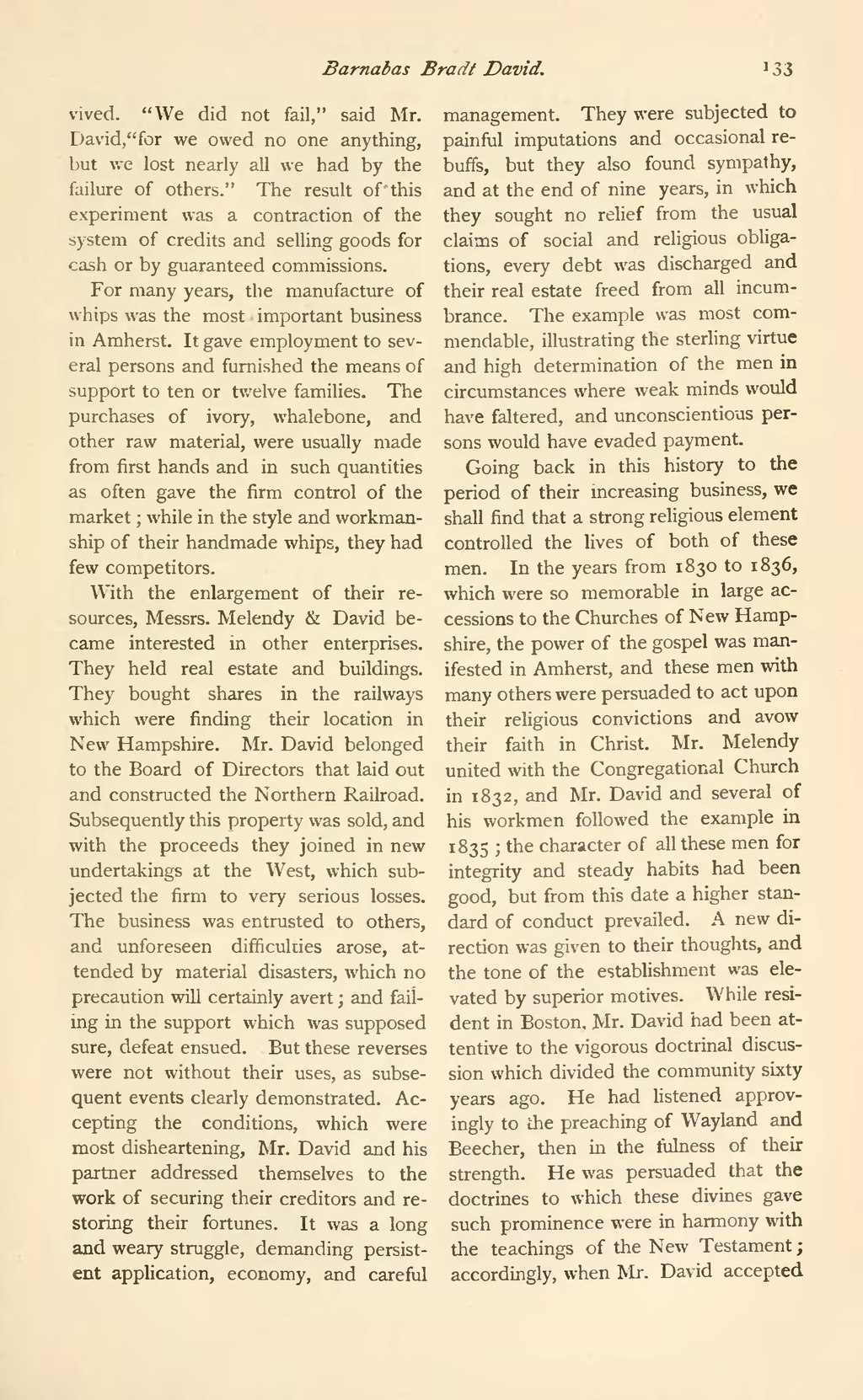Barnabas Bradt David.
��^ZZ
��vived. "We did not fail," said Mr. David,"for we owed no one anything, but v.-e lost nearly all we had by the failure of others." The result of' this experiment was a contraction of the system of credits and selling goods for cash or by guaranteed commissions.
For many years, the manufacture of whips was the most - important business in Amherst. It gave employment to sev- eral persons and furnished the means of support to ten or tv/elve families. The purchases of ivory, whalebone, and other raw material, were usually made from first hands and in such quantities as often gave the firm control of the market ; while in the style and workman- ship of their handmade whips, they had few competitors.
With the enlargement of their re- sources, Messrs. Melendy & David be- came interested in other enterprises. They held real estate and buildings. They bought shares in the railways which were finding their location in New Hampshire. Mr. David belonged to the Board of Directors that laid out and constructed the Northern Railroad. Subsequently this property was sold, and with the proceeds they joined in new undertakings at the West, which sub- jected the firm to very serious losses. The business was entrusted to others, and unforeseen difficukies arose, at- tended by material disasters, which no precaution will certainly avert ; and fail- ing in the support which was supposed sure, defeat ensued. But these reverses were not without their uses, as subse- quent events clearly demonstrated. Ac- cepting the conditions, which were most disheartening, Mr. David and his partner addressed themselves to the work of securing their creditors and re- storing their fortunes. It was a long and weary struggle, demanding persist- ent application, economy, and careful
��management. They were subjected to painful imputations and occasional re- buffs, but they also found sympathy, and at the end of nine years, in which they sought no relief from the usual claims of social and rehgious obliga- tions, every debt was discharged and their real estate freed from all incum- brance. The example was most com- mendable, illustrating the sterling virtue and high determination of the men in circumstances where weak minds would have faltered, and unconscientious per- sons would have evaded payment.
Going back in this history to the period of their increasing business, we shall find that a strong religious element controlled the lives of both of these men. In the years from 1830 to 1836, which were so memorable in large ac- cessions to the Churches of New Hamp- shire, the power of the gospel was man- ifested in Amherst, and these men with many others were persuaded to act upon their religious convictions and avow their faith in Christ. Mr. Melendy united with the Congregational Church in 1832, and Mr. David and several of his workmen followed the example in 1835 i the character of all these men for integrity and steady habits had been good, but from this date a higher stan- dard of conduct prevailed. A new di- rection was given to their thoughts, and the tone of the establishment was ele- vated by superior motives. While resi- dent in Boston, Mr. David had been at- tentive to the vigorous doctrinal discus- sion which divided the community sixty years ago. He had hstened approv- ingly to the preaching of Wayland and Beecher, then m the fulness of their strength. He was persuaded that the doctrines to which these divines gave such prominence were in harmony with the teachings of the New Testament ; accordingly, when Mr. David accepted
�� �
